|
|
|
Sort Order |
|
|
|
Items / Page
|
|
|
|
|
|
|
| Srl | Item |
| 1 |
ID:
087296
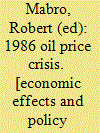

|
|
|
|
|
| Publication |
Oxford, Oxford University Press, 1988.
|
| Description |
xii, 286p.
|
| Standard Number |
0197300073
|
|
|
|
|
|
|
|
|
|
|
|
Copies: C:1/I:0,R:0,Q:0
Circulation
| Accession# | Call# | Current Location | Status | Policy | Location |
| 029496 | 338.23/MAB 029496 | Main | On Shelf | General | |
|
|
|
|
| 2 |
ID:
169899
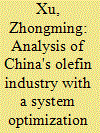

|
|
|
|
|
| Summary/Abstract |
Recently, China produces olefins increasingly from coal, although OTO (oil-to-olefins) is still dominating China's olefin industry. With the uncertain future dynamics of oil and coal prices, as well as environmental issues, how should China configure its future olefin industry? And what kind of carbon emission controlling policies should be implemented if more olefins would be produced with CTO (coal-to-olefins) in China? This paper develops a system optimization model to explore these questions. With four different scenarios of oil and coal prices, we first explore the optimal configuration of China's olefin industry without considering controlling carbon emission; then we explore the situation in which new CTO capacity must implement CCS (carbon capture and storage) for controlling carbon emission. The results of our study imply that investing in CTO technology in China is not a wrong direction, especially as a technology stock for energy safety, and it could be a good regulation to require CTO to implement CCS for achieving both economic and environmental values.
|
|
|
|
|
|
|
|
|
|
|
|
|
|
|
|
| 3 |
ID:
087712
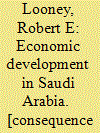

|
|
|
|
|
| Publication |
London, Jai Press Inc., 1990.
|
| Description |
xxii, 289p.
|
|
|
|
|
|
|
|
|
|
|
|
Copies: C:1/I:0,R:0,Q:0
Circulation
| Accession# | Call# | Current Location | Status | Policy | Location |
| 042645 | 338.9538/LOO 042645 | Main | On Shelf | General | |
|
|
|
|
| 4 |
ID:
113485
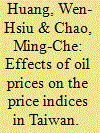

|
|
|
|
|
| Publication |
2012.
|
| Summary/Abstract |
This study employs the multivariate threshold model developed by Tsay (1998) to examine the effects of international and domestic oil prices on the price indices in Taiwan using monthly data from January 1999 to December 2011. The results show that changes in domestic oil prices do not Granger cause changes in the price indices when the oil price change exceeds the threshold level. However, international oil price shocks still affect the wholesale price index through the effects of announcement and expectation. Therefore, controlling domestic oil prices to prevent volatility in the price indices is ineffective. If we focus on the period when the left-wing party is in power, we also find that changes in international oil prices have more critical effects on the price indices than changes in domestic oil prices. However, the lead-lag relationship between changes in domestic oil prices and changes in the price indices vanishes except with respect to the transportation category where the consumer price index is affected by domestic oil prices. This result may be due to the government's extensive intervention in setting oil prices.
|
|
|
|
|
|
|
|
|
|
|
|
|
|
|
|
| 5 |
ID:
166446


|
|
|
|
|
| Summary/Abstract |
This study examines the linkages between energy price and food prices over the period 2000–2016 by using a Panel-VAR model in the case of eight Asian economies. Our results confirm that energy price (oil price) has a significant impact on food prices. According to the results of impulse response functions, agricultural food prices respond positively to any shock from oil prices. Our results show that there is a linkage between energy and food security through price volatility. Since inflation in oil price is harmful for food security, it would be necessary to diversify the energy consumption in this sector, from too much reliance on fossil fuels to an optimal combination of renewable and nonrenewable energy resources that will be in favor of not only the energy security by also the food security. In addition, the paper found that the impact of biofuel prices on food prices is statistically significant but explains less than 2% of the food price variance. However, by increasing the demand for biofuel, there should be more concern about the global increase in agricultural commodities prices and endangering food security, especially in vulnerable economies.
|
|
|
|
|
|
|
|
|
|
|
|
|
|
|
|
| 6 |
ID:
149948
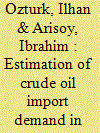

|
|
|
|
|
| Summary/Abstract |
The aim of this study is to model crude oil import demand and estimate the price and income elasticities of imported crude oil in Turkey based on a time-varying parameters (TVP) approach with the aim of obtaining accurate and more robust estimates of price and income elasticities. This study employs annual time series data of domestic oil consumption, real GDP, and oil price for the period 1966–2012. The empirical results indicate that both the income and price elasticities are in line with the theoretical expectations. However, the income elasticity is statistically significant while the price elasticity is statistically insignificant. The relatively high value of income elasticity (1.182) from this study suggests that crude oil import in Turkey is more responsive to changes in income level. This result indicates that imported crude oil is a normal good and rising income levels will foster higher consumption of oil based equipments, vehicles and services by economic agents. The estimated income elasticity of 1.182 suggests that imported crude oil consumption grows at a higher rate than income. This in turn reduces oil intensity over time. Therefore, crude oil import during the estimation period is substantially driven by income.
|
|
|
|
|
|
|
|
|
|
|
|
|
|
|
|
| 7 |
ID:
139730
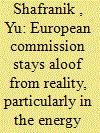

|
|
|
|
|
| Summary/Abstract |
International Affairs: Heres our first question, Yuri Konstantinovich: The sanctions regime has presently become one of the most sensitive aspects in the relations between Russia and the West. Do you think that this kind of policy pursued by European nations and the United States has been dealing damage to Russia's economic development?
|
|
|
|
|
|
|
|
|
|
|
|
|
|
|
|
| 8 |
ID:
110741


|
|
|
|
|
| Publication |
2011.
|
| Summary/Abstract |
As the uncertainty of oil price increases, impacts of the influential factors on oil price vary over time. It is of great importance to explore the core factors and its time-varying influence on oil price. In view of this, based on the PATH-ANALYSIS model, this paper obtains the core factors, builds an oil price system VAR model, which uses demand, supply, price, and inventory as endogenous variables, and China's net imports as well as dollar index as exogenous variables. Then we set up a BVAR-TVP (Time varying parameter) model to analyze dynamic impacts of core factors on oil price. The results show that: (1) oil prices became more sensitive to oil supply changes, and the influence delays became shorter; (2) the impact of oil inventories on oil prices with a time lag of two quarters but has a downward trend; (3) the impact of oil consumption on oil prices with a time lag of two quarters, and this effect is increasingly greater; (4) the US dollar index is always the important factor of oil price and its control power increases gradually, and the financial crisis (occurred in 2008) further strengthens the influence of US dollar.
|
|
|
|
|
|
|
|
|
|
|
|
|
|
|
|
| 9 |
ID:
069207
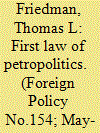

|
|
|
| 10 |
ID:
075811
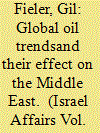

|
|
|
| 11 |
ID:
088216
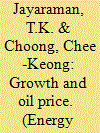

|
|
|
|
|
| Publication |
2009.
|
| Summary/Abstract |
This paper investigates the nexus between economic growth and oil price in small Pacific Island countries (PICs). Except Papua New Guinea, none of the 14 PICs has fossil any fuel resources. Consequently, the other 13 PICs are totally dependent on oil imports for their economic activities. Since PICs have limited foreign exchange earning capacities, as they have a very narrow range of exports and are highly dependent on foreign aid, high oil prices in recent months have seriously tested their economic resilience. This paper applies the ARDL bounds testing methodology to four selected PICs, Samoa, Solomon Islands, Tonga and Vanuatu, which have consistent and reliable time series of data, with a view to assess the impact of oil price on economic growth. The findings are that oil price, gross domestic product and international reserve are cointegrated in all the four PICs. Further, both in the long and short runs, we observe that there is a uni-directional relationship as causality linkage runs only from oil price and international reserves to economic growth. The paper makes some policy recommendations.
|
|
|
|
|
|
|
|
|
|
|
|
|
|
|
|
| 12 |
ID:
092801
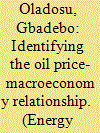

|
|
|
|
|
| Publication |
2009.
|
| Summary/Abstract |
This paper employs the empirical mode decomposition (EMD) method to filter cyclical components of US quarterly gross domestic product (GDP) and quarterly average oil price (West Texas Intermediate-WTI). The method is adaptive and applicable to non-linear and non-stationary data. A correlation analysis of the resulting components is performed and examined for insights into the relationship between oil and the economy. Several components of this relationship are identified. However, the principal one is that the medium-run component of the oil price has a negative relationship with the main cyclical component of the GDP. In addition, weak correlations suggesting a lagging, demand-driven component and a long-run component of the relationship were also identified. Comparisons of these findings with significant oil supply disruption and recession dates were supportive. The study identifies a number of lessons applicable to recent oil market events, including the eventuality of persistent oil price and economic decline following a long oil price run-up. In addition, it was found that oil market related exogenous events are associated with short- to medium-run price implications regardless of whether they lead to actual supply losses.
|
|
|
|
|
|
|
|
|
|
|
|
|
|
|
|
| 13 |
ID:
133210
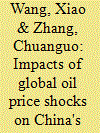

|
|
|
|
|
| Publication |
2014.
|
| Summary/Abstract |
This paper investigated the impacts of oil price shocks on China×s fundamental industries. In order to analyze the reactions of different industries to oil price shocks, we focused on four fundamental industries: grains, metals, petrochemicals and oil fats. We separated the oil price shocks into two parts, positive and negative parts, to investigate how commodity markets react when oil prices go up and down. We further studied the extreme price movements, called jumps, existing in the oil markets and how jump behavior has affected China×s commodity markets. Our results suggest that asymmetric effects of oil price shocks did exist in the four markets and the negative oil price shocks had stronger influences on the four markets in China. The petrochemicals market suffered most from the oil price shocks, and the grains market was least sensitive to the shocks. When jumps occurred in the crude oil market, the four commodity markets would be affected differently. The oil fats market and petrochemicals market tended to "overreact" to jumps.
|
|
|
|
|
|
|
|
|
|
|
|
|
|
|
|
| 14 |
ID:
122812
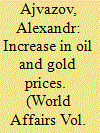

|
|
|
| 15 |
ID:
178628
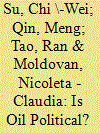

|
|
|
|
|
| Summary/Abstract |
This paper investigates the political property of oil from the perspective of geopolitical risk (GPR). We explore the relationship between GPR and oil price (OP) by performing the full-sample and subsample rolling-window bootstrap Granger causality tests. We find that wars will lead to an increase in OP but that low GPR cannot lead to an immediate decline in price. This finding can also be explained by economic crises, which can make OP soar while GPR is low. In turn, the rise in OP has a positive impact on GPR. The oil market has a significant interaction with geopolitical events, which reflects the pattern of global politics, so we can conclude that oil has a political property. In the context of a tense and complex global relationship, the world can benefit from the political property of oil to prevent GPR, which can in turn facilitate an accurate prediction of OP to reduce the adverse effects of large fluctuations in the oil market.
|
|
|
|
|
|
|
|
|
|
|
|
|
|
|
|
| 16 |
ID:
104645
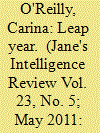

|
|
|
| 17 |
ID:
181771
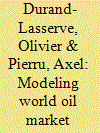

|
|
|
|
|
| Summary/Abstract |
The choice of a modeling approach is driven by the oil policy or market question that needs to be addressed. We provide the non-modeling community with insightful information on oil market models, shedding light on the economic interpretation of technical aspects (such as the meaning of the costs associated with certain types of constraints), but without introducing any mathematical formulations. We also emphasize the reasonings and assumptions underlying the modeling structures and solutions proposed in the literature. We first review how models have usually represented market fundamentals. We then examine recent modeling developments addressing market issues (such as the impact of the shale oil revolution and the shift in producers’ behavior) and policy questions (such as the use of spare capacity to stabilize prices, the lifting of export controls, and the management of uncertainties surrounding the energy transition) that have emerged since the Great Recession. Moreover, given that climate policies increase the interdependency of all energy markets, we discuss how long-term multi-fuel models produce scenarios for oil as part of the global energy mix. We also suggest ways to tackle questions not yet covered by the oil market modeling literature, such as the dependence of government budgets on oil revenues.
|
|
|
|
|
|
|
|
|
|
|
|
|
|
|
|
| 18 |
ID:
104255
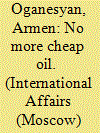

|
|
|
|
|
| Publication |
2011.
|
| Summary/Abstract |
ACCORDING TO Suleiman Jasir Al-Herbish, Director-General of the OPEC Fund for International Development (OFID), there will be no more cheap oil. We met at the OFID headquarters in Vienna, a magnificent palace built in the days of the Austrian Empire and richly decorated with columns, stucco, massive oak doors and red carpet runners.
Since 1976, OFID has been a major international development agency, as well as an authoritative research and analysis center. The Fund's main task is to strengthen cooperation and OPEC's influence in developing countries. Financial assistance provided by the Fund has exceeded $10.6 billion, including more than $1.4 billion in the form of grants. Mr. Al-Herbish's assessment of the current state of the global market and the strategy for the development of the oil sector is all the more interesting because he previously served as chairman or member of the board of some of the largest Saudi Arabian oil companies.
|
|
|
|
|
|
|
|
|
|
|
|
|
|
|
|
| 19 |
ID:
092809
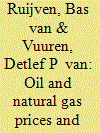

|
|
|
|
|
| Publication |
2009.
|
| Summary/Abstract |
The hikes in hydrocarbon prices during the last years have lead to concern about investment choices in the energy system and uncertainty about the costs for mitigation of greenhouse gas emissions. On the one hand, high prices of oil and natural gas increase the use of coal; on the other hand, the cost difference between fossil-based energy and non-carbon energy options decreases. We use the global energy model TIMER to explore the energy system impacts of exogenously forced low, medium and high hydrocarbon price scenarios, with and without climate policy. We find that without climate policy high hydrocarbon prices drive electricity production from natural gas to coal. In the transport sector, high hydrocarbon prices lead to the introduction of alternative fuels, especially biofuels and coal-based hydrogen. This leads to increased emissions of CO2. With climate policy, high hydrocarbon prices cause a shift in electricity production from a dominant position of natural gas with carbon capture and sequestration (CCS) to coal-with-CCS, nuclear and wind. In the transport sector, the introduction of hydrogen opens up the possibility of CCS, leading to a higher mitigation potential at the same costs. In a more dynamic simulation of carbon price and oil price interaction the effects might be dampened somewhat.
|
|
|
|
|
|
|
|
|
|
|
|
|
|
|
|
| 20 |
ID:
088062
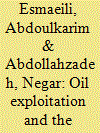

|
|
|
|
|
| Publication |
2009.
|
| Summary/Abstract |
This study refers to a panel estimation of an environmental Kuznets curve (EKC) for oil to determine the factors most affecting oil exploitation in 38 oil-producing countries during 1990-2000. Control variables such as oil reserves, oil price, population, political rights, and the Gini index were used to determine its contribution to the main EKC model. The empirical results fully support the existence of an EKC for oil exploitation. Furthermore, the result indicates that the proved oil reserves has a significant and positive role in oil production, but oil price and population do not significantly affect crude oil production. Also, increased freedoms and a better income distribution will reduce the rate of oil exploitation. Thus, policies aiming at enhancing democratic society and better income distribution would be more compatible with sustainability.
|
|
|
|
|
|
|
|
|
|
|
|
|
|
|
|
|
|
|
|
|